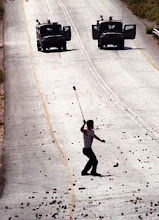I'm writing from the city of Hakkari, population 200,000, close to the border with Iran and Iraq. These past few days have been a mixture of awe, hope, sadness and revolutionary energy. But that is why I came to Kurdistan in the first place, to understand and feel those emotions.
I had read in the newspaper that Abdullah Ocalan ("Apo"), the PKK's jailed leader, would announce the rebels' peace plan on August 15th, coinciding with the 25th anniversary of the PKK's first armed action. It would be held in the same town that witnessed the start of this bloody war, a small town called Eruh, in the Şirnak province. (Eruh, by the way, is the Turkish name. Dihe is the Kurdish name. As part of the Turkish nationalism and subsequent intent to disappear the Kurdish people, all town and city names were changed to Turkish). What I thought would be a simple reading of the peace plan, with possibly some celebrations, was actually a cultural and political reinvindication on a massive scale: some 20,000+ Kurds from all over the country flocked to this tiny town, dancing up a dust cloud, chanting PKK slogans, and in general, feeling proud to be Kurdish.
Parliamentarians from the pro-Kurdish DTP party were present alongside women, men, elders, children, all flashing the "V" sign and calling for peace. The DTP party is undergoing a Batasuna-type persecution, as the Turkish government is considering banning them for alleged links to the PKK. Links to the PKK? They would have to try all 20,000 people attending the festival, because everyone I talked to and danced with were consumed by the PKK. Some elder women and men with whom I talked told me that they, too, had served in the Kurdish army. It was in the dances, the songs, the womens' ululations; it was in the air, in the dust, and even in the mountains, as at night, the seemingly elusive guerrillas defied the Turkish extra-security measures (tanks, army, riot squads, you name it) and from the mountain sides, lit fires that spelled out "Apo" and "PKK". It was surreal.
(As for criminalizing the DTP, Turkey should learn a good lesson from Colombia's civil war, when the government's politicide of the Patriotic Union forced many people back into the mountains.)
Apparently I was the only foreigner there, and people were either welcoming, curious or oblivious, but mostly the first two. I was put through impromptu intensive Kurdish-language courses and taught how to dance by linking pinky fingers and putting your whole heart and soul into it.
The guns in the mountains were silent that day, although the rest of my journey showed me that Kurdistan is a region under absolute and complete military occupation. On the road from Şirnak to Hakkari, there is a checkpoint almost every 10km, making the already torturous drive (everyone was puking from the winding roads) that much more horrible. Tanks and APCs line the highway. Almost every village along the road has a military base (the Turkish armed forces number some 1,000,000+, making it the secong largest armed forces in NATO after the US. If you figure the Turkish population is roughly 75 million, that makes 1 in 75 people...), and if there are no soldiers, you most likely catch sight of Kurdish men armed with AK-47s: the village guards. In Colombia, they are called paramilitaries or "Convivir", but other than that there is no difference. In exchange for near total impunity, the village guards are fully equipped and sent out to defend against PKK attacks. A massacre in May of this year by village guards at a wedding has not affected their utilization by the Turkish army.
On one bus trip, a pretty burly Kurd sat next to me, and after determining that I posed no threat, pulled out his mobile phone and showed me a video. It showed a dead Kurdish fighter on the road, his tongue having been cut out by the Turkish public forces before he was killed.
In Beytuşşeba
One police officer asked me if I liked this area, to which I replied that it was beautiful. He seemed sincere when he retorted "You think this SHIT is beautiful? It's nothing but rock!" I could only imagine what he thought of Kurds.
That night, in
It's been an amazing time. Hope to keep you all updated on more stuff. Oh and by the way, Ocalan's peace map wasn't revealed after all on the 15th, because apparently it wasn't ready. Should be out by the 19th. The far-right MHP party and the CHP are already opposing the PKK plan as well as the ruling AKP's plan for the "Kurdish problem" saying that it goes against Kemalist (Ataturkist) notions of Turkish unity. So 2009 may see the end of the conflict, or once againg simply a lull in fighting. We'll see...
Pictures from Kurdistan, click here.


No comments:
Post a Comment